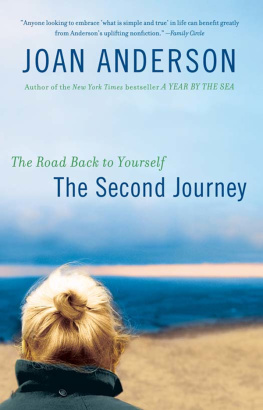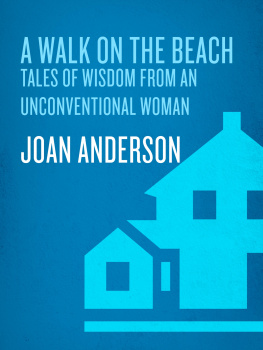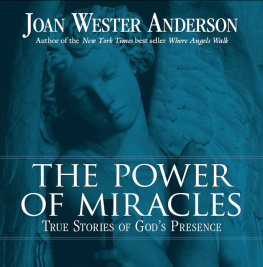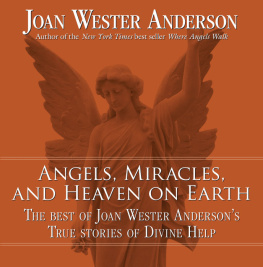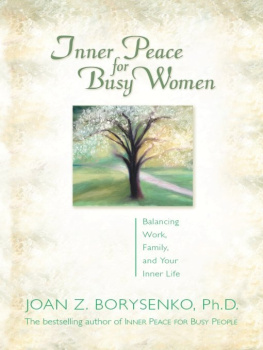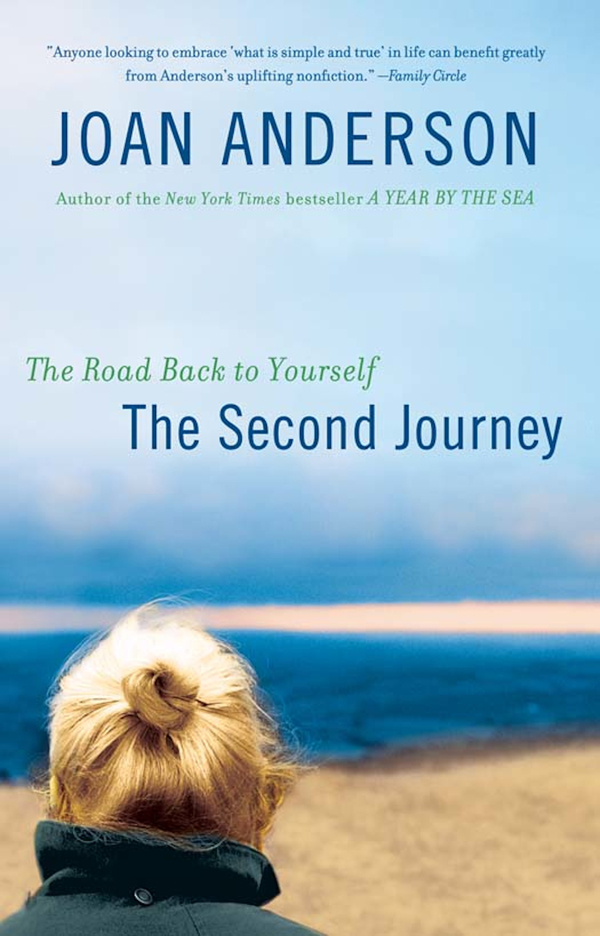
The Second Journey
The Road Back to Yourself
JOAN ANDERSON

To Andrew and Luke...
Gratitude for the lessons you offered me during the first journey in preparation for the second
Ten Years Later
one small thing
Ive learned these years,
how to be alone,
and at the edge of aloneness
how to be found by the world.
Innocence is what we allow
to be gifted back to us
once weve given ourselves away.
There is one world only,
the one to which we gave ourselves
utterly, and to which one day
we are blessed to return.
David Whyte
from
The House of Belonging
Contents
Most of us, halfway to a hundred, confront a need for greater self-awareness. We reach a point when the power of youth is gone, the possibility of failure presents itself, and the dreams of earlier times seem shallow and pointless. And then we find ourselves asking the tough questions: What am I meant to do now? What really matters? Who am I?
For many years I had ignored these questions because I had too many responsibilitiestoo many other lives to consider. But all of a sudden, there were no more excuses. Old truths and ideals no longer served me. I was restless, unhappy, and full of an undefined ache, standing at a crossroads with no clear idea of what path to follow. I only knew that I needed a change. So I took a leap of faith, walked away from the mainstream of life, and dove headlong into the unknown.
My first book, A Year by the Sea , tells about the awakening I experienced when I left behind my husband and family to live on Cape Cod. It is a very personal memoir that has helped hundreds of thousands of women wake up as well. But the itinerary I designed for myself during that year alone proved difficult to hold on to once I returned to living with others. It was one thing to live a simple life, guided by the cycles of nature and my own inner tides while I walked the beaches of Cape Cod and cooked dinner for one, quite another to do so once I resumed my place in the web of family and friends, and a career.
This book chronicles the ten years from that time of awakening to the more recent past, when I finally began to feel settled into my own reality. In the process of eliminating illusion, I was able once and for all to embrace what is simple and true. By looking back at the roads I chose to travel, I came to see how many were valid and how many were notthose that I happened upon quite by accident where lessons were learned and hardships endured, and those that led to counterfeit destinations that in the short term seemed attractive but in the long term proved catastrophic.
It is my hope that through my sharing of pitfalls and triumphs, you will be encouraged to create your own new itinerary, knowing all the while that detours, back roads, and slippery causeways are all parts of the journey as well as its lessons. But how do such journeys begin?
The call to a second journey usually commences when unexpected change is thrust upon you, causing a crisis of feelings so great that you are stopped in your tracks. Personal events such as a betrayal, a diagnosis of serious illness, the death of a loved one, loss of self-esteem, a fall from power are only a few of the catalysts. A woman caught thusly has no choice but to pause, isolate, even relocate until she can reevaluate the direction in which she should head. Should she stay the course or choose another path?
But alas, many of us inhibit our capacity for growth because the culture encourages us to live lives of uniformity. We stall, deny, ignore the ensuing crisis because of confusion, malaise, and yes, even propriety. Yet more and more, I come in contact with women, particularly in midlifethat uneasy and ill-defined periodwho do not want merely to be stagnant but rather desire to be generative. Todays woman has the urge to go against the prevailing currents, step out of line, and break with a polite society that has her following the unwritten rules of relationship, accepting the abuses of power in the workplace, and blithely living with myriad should s when she has her own burgeoning desires.
This book will help you navigate through changefrom being merely awakened to being a determined, impassioned pilgrim on her own individual path. This does not mean giving up family and friends; it simply means integrating the web of family and other relationships into your world so that they are a part of your life but not your entire life.
During my travels or life experiences, I was made to account for that which was outlived in my life and that which was unlived. By gradually letting go of that which was finished or outlived, I was able to make room for and welcome new endeavors and yet-unlived possibilities.
We are born to be ourselvesin need of upgrading the geneto look back again and again and befriend that person we once intended to become. Life, like a beach, is always rearranging itself. The trick is to welcome and then work with, not against, the changes, and in doing so deepen our innate strengths. Knowing, acknowledging, and celebrating the phases all women go throughhow weve risen above our angst, respecting our very determinationthat is the fodder needed to continue our independent journeys. The goal is to come of age in the middle of life rather than live out our days lacking purpose and energy. Its all about rearranging our lives in our own image.
Chapter 1
Dead End
September
The actual arrival at a goal always creates a turmoil unconnected to any previous imaginings.
David Whyte
It is a glittering September morning, and I am sitting on a deck at the edge of a salt marsh, coffee cup in hand, feet up on the railing, relaxed and more than ready for a morning of catch-up with Ro and Susan, two of my closest friends on Cape Cod. I take a deep breath, gaze out at the marsh grass, now turning burnt orange as the sun climbs higher, and remember why I love the Cape so muchespecially this particular spot, where if the wind is blowing just right, I can hear the roar of the Atlantic in the distance. Here, in a moment such as this, I feel an abiding sense of harmony. Everything is right with the world.
So, Susan begins as soon as the basket of croissants has been around once, youve finally made it to the porchfirst time in three months. I turn sharply away from the landscape and toward the note of sarcasm I hear in her voice, and I am startled to see severe looks on both her and Ros faces.
What are you talking about? I ask, and then I take a gulp of coffee and wait for an answer that is not forthcoming. I was in the mood for a long overdue social gathering, one of those leisurely mornings we used to share regularly before the chain of appearances associated with promoting my last book and writing the new one got in the way. But it is obvious that they are preparing to take me to task. I know the signs all too well. Lately it seems I cant keep anyone happy. At the end of August, after the annual family gathering, my kids left complaining that I had seemed distracted the whole time they were here; my ninety-one-year-old mother stops by every morning and sighs loudly when I remind her I have to work; and my agent is forever pestering me about impending deadlines. No matter how hard or how fast I pedal, I constantly feel as if I am slipping backward as I head uphill.
You two know how much work I have right now, I say with more than a hint of frustration. Both used to hold high-pressure jobs before retiring to Cape Cod. Susan had been a television producer and Ro a marketing executive. Both women had also raised children and sustained marriages. They came to the Cape tired, worn out, and ready for adventure. Weve kayaked, hiked the Capes beaches, shopped, and shared a lifetimes worth of secrets. They are usually sympathetic to my schedule, and they are the first people I call when I am stuck and need a good trek through the woods to sort out my thoughts. So I am surprised at the sharpness in the air.
Next page
